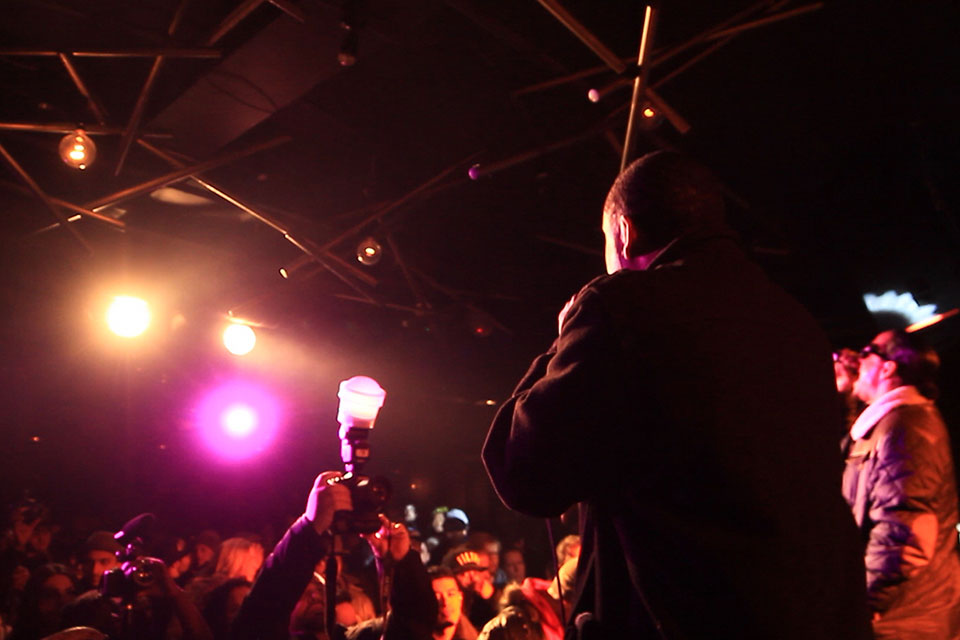What am I contributing to — and why? What is the point of all of this?
If you have been a part of Toronto’s hip-hop scene in any way, pretty much since its inception, chances are you’ve had this moment of inner self-reflection at least a time or two. I know I have.
It’s the premise on which Another Decaying Crown, a feature-length documentary by Whitby, Ont. director Alex Huard and Toronto rap artist SepTo is built on. What started as a project to show the no-glitz, no-glamour realities of putting out SepTo’s 2015 God Mind project, turned into a deep dive with influential members of Toronto’s hip-hop community (Rich Kidd, Beatchild and more) reflecting on themes of artist struggle and contributing to an ever-evolving, over-saturated music industry.
While the film centres on music, it hit home for me. It wasn’t just how the conversations of evolution and over-saturation resonated with how social media, blogs and digital-everything has turned the media industry and the craft of community journalism on its head in the time since 2004 when we launched Urbanology Magazine.

“There’s just too much lights and grandiose nonsense and I’ve always been very self-conscious about how I present myself and how I’m being perceived.”
It was also the familiarity of scenes like SepTo sitting at home packaging CDs into brown envelopes, hand-writing addresses on them, and walking to the post office to fulfill online orders of his album. All things we did for print subscribers of Urbanology. It was seeing Urbanology’s senior writer and podcast host Sean “Bluu” Watson, one of our founding team members, listed as the executive producer in the credits and reflecting on how far he has made it with his own screenwriting and film dreams. And of course, it was seeing two pillars of my youth — Lester B. Pearson high school and Malvern mall — on screen, and reflecting on how neighbourhoods influence and impact us.
Whether it is the realities of juggling a job (sometimes multiple), while pursuing a creative venture, or the internal conflict that happens when feelings of burnout, exhaustion and lack of motivation are constantly wrestling passion, creativity and a desire to contribute, I saw so much of myself wrapped up in the story arc of Another Decaying Crown. Despite never spitting a single bar. The story’s universality is tangible. And it was only made more evident when I connected with SepTo and Alex Huard on a Sunday afternoon to discuss the film and its premiere at the Toronto Independent Film Festival.
What specifically prompted the making of the story that’s told in Another Decaying Crown?
SepTo: The original goal was to very soberly show the ‘Toronto hip-hop industry.’ There’s a lot of bells and whistles . . . a lot of artists create this aura that is not real. Generally, we’re all just struggling artists for the most part, and I just wanted to show that. But I think a different story just sort of took hold. The process with Alex filming us, me with family, me with friends, me in the studio, me at work, whatever, for a couple of years. What he ended up capturing more so was the story arc that became Another Decaying Crown where I’m just dipping in inspiration as I’m supposed to be promoting the album. And now when we’re meeting with Beatchild and Rich Kidd, we’re now talking to them more so about why. What are we doing and why are we doing this? Getting everyone’s sort of vantage points around what this is really and what artistry is and what matters and what doesn’t matter and oversaturation.
I noticed recently, SepTo, that you had tweeted a few things on what the film was about and what it wasn’t. What prompted those posts?
SepTo: There’s just too much lights and grandiose nonsense and I’ve always been very self-conscious about how I present myself and how I’m being perceived. I’ve been hearing a lot of buzz and a lot of excitement about the film being in the festival and I’m hearing a lot of people say, ‘yeah this film is a SepTo documentary.’ And I just wanted to clarify, ‘hey, that’s corny.’ I would never ever set out to make a feature-length film about myself and then tell you guys to go watch it . . . It is following me on a journey but it’s much more about these more theoretical, larger themes.
#ADC explores greater themes of artist struggle and internal conflict through the perspectives and opinions of many contributors to Toronto’s music community. It examines the decaying usefulness and impact of today’s “true artist” within a newly-evolved and over-saturated market.
— SepTo.ca (@MindOfSepTo) September 8, 2018
Alex Huard: I think it’s good that it’s somebody like him pushing this idea, not even an idea, this reality that it’s not all just glitz and glam . . . A lot of people are looking for things in a short period of time and it’s really hurting true artists out there.
SepTo: It just all gets lost a bit. That’s kind of the point of how we phrased the title of the film, Another Decaying Crown. The word ‘another’ is important because we’re saying there’s these royal people, these special people, there’s these true artists in whatever way you want to attribute their artistry. There’s these true artists that are kind of falling off the map, losing their personal need to contribute for these different reasons.
Huard: It’s also important to know that it wasn’t made out of anger, you know, that we’re angry because in people’s perceptions Sep’s not achieving fame so he’s just angry. It’s made out of frustration and it’s showing through the other artists that we interview in the movie. It’s a frustrating time right now and it has been for a while and it’s just what can we do to try to change that mentality and approach to creating.
SepTo: That actually speaks to your question about why I wanted to clarify things because you know there is a part of me that hopes that people don’t take in this film . . . [and think] like if he reached Jay-Z level then he’d be fine, you know. I do want to stress [for] people to go back to the music. The first piece I ever put out and probably on every single project you hear me speaking like ‘hey, this is not an occupation guys, contribute to the art, guys.’

Hip-hop has “definitely grown into a thing that you can see from very far away and unfortunately when it’s that big, those new people that might jump on it, have less of an opportunity to understand what it really is.”
In the film, SepTo says there are some people who, for example, learned to rap six months ago, and then release a mixtape, and basically that kind of doesn’t have the same respect for the art form. Expand on that. What would you like to see from people who are entering this art form today?
SepTo: It’s not necessarily a set of rules or actions that need to be obeyed, it’s more something we can’t quantify – it’s more based on people’s intentions. That quote that you’re speaking on, in the film, is coupled with me referencing a Questlove essay where he’s talking about disco and how disco is a caricature. It’s this thing where we can see it and we can point it out and laugh about it, it’s no longer of essence, it’s no longer this real thing anymore, it’s more of just a costume. That’s kind of more so what I’m referencing – this idea that you can just hear about hip-hop from whatever place you get it and you don’t really know what it is so you’re contributing to an art form without real, good intentions for the art form . . . I think it’s reached a point where it’s grown into this thing – and I’m not talking about sound either because I love a lot of the music today – it’s definitely grown into a thing that you can see from very far away and unfortunately when it’s that big, those new people that might jump on it, have less of an opportunity to understand what it really is.
View this post on Instagram
Now that the film is screening at the Toronto Independent Film Festival – how does it feel?
Huard: I feel good. Mostly because we hadn’t heard back from any festival. That was the first one. It really sweetened the pot. There’s an organization, there’s people that are in the industry that have watched this and have chosen it and that’s really what you kind of work towards.
SepTo: It is just the start, Alex. Alex tends to hold onto his victories and say, ‘if this is all I get that would be great’ . . . You have to remember all of this is on purpose. You have to remember the whole point of the film was, ‘OK, I don’t want to contribute to hip-hop in this way anymore. Everyone wants an album or a mixtape every three months. I don’t want to do that’ and ‘I don’t want to make any music videos.’ Next thing you know we’re making a documentary about a hip-hop album I released three years ago. We were purposefully slowing down the cycle and just making people sit and appreciate a moment in time three years later. There’s a lot of conscious effort here to do exactly what we intended to do. This film festival is the beginning.
For everyone who is going to come out to the screening, and anyone else who watches the film, what do you hope they may get from it?
Huard: I think it’s again just for us to think about how we approach art and having an understanding why we’re doing it, and why it needs to be seen or heard or read . . . Before you post that picture and hashtag everything why are you putting it out there? And same with music. Just put some thought into your art before releasing it and expecting the world back.
SepTo: Think is really just a key word here. There isn’t any answers . . . I think we just need to be careful about what we’re contributing to. We’re artists – if you’re really about this thing of contribution then you’re going to create. I didn’t make an album, I didn’t write a verse, but I did write a film . . . Be very careful about your intentions and what you might be unintentionally contributing to in this thing that people love. It goes for everything. It’s just – are you killing something? Are you over saturating something? Are you making something pointless? Are you taking the voice away from people who should be the voices? Are you adding to the noise? I think that that’s a key theme that I hope people take away. They can make their choice from there of what am I contributing to.
Another Decaying Crown premieres at the Toronto Independent Film Festival on September 15, 2018 @ 9 p.m.
This article is the first edition of Their Story, My Journey by Urbanology Magazine co-founder, Priya Ramanujam. About this series: As journalists, we are taught to separate ourselves from the subjects that we cover. But in Their story, my journey I am going to go against this concept. In the months leading up to Urbanology’s 15-year anniversary, I am seeking to recognize some of the incredibly talented people who I have met through my work as the publication’s co-founder and editor, in the best way I know how: sharing their stories. Not only will I speak with them about the impact they’re making, but I’ll reflect on how their story directly resonates with, and intersects with, my journey.




1 Comment
Pingback: Another Decaying Crown tells universal story of artist struggle – Urbanology Magazine – vividlyfoxxy